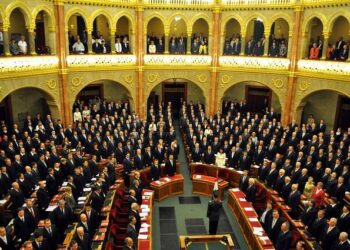Hungary has secured a financial shield agreement with the United States, Prime Minister Viktor Orb√°n announced on Tuesday, signaling strengthened economic ties between Budapest and Washington. The deal, aimed at bolstering Hungary’s fiscal stability amidst global uncertainties, underscores the growing cooperation between the two nations. Details of the agreement were disclosed during Orb√°n’s remarks covered by Reuters, highlighting Hungary’s efforts to safeguard its economy in a turbulent international environment.
Hungary Secures Financial Shield Agreement with Washington to Bolster Economic Stability
Hungary’s new financial arrangement with Washington marks a significant step toward strengthening the nation’s economic resilience. The agreement, confirmed by Prime Minister Viktor Orb√°n, is designed to provide a robust safety net amid global market uncertainties, assuring investors and citizens alike of Hungary’s fiscal stability. With this deal, Hungary aims to fortify its currency against external shocks and enhance liquidity, supporting sustained growth and safeguarding critical sectors.
The parameters of the financial shield focus on key areas where immediate impact can be felt:
- Enhanced monetary collaboration: Strategic coordination with U.S. economic bodies to stabilize exchange rates and control inflationary pressures.
- Targeted credit support: Facilitating access to capital for small and medium enterprises battling economic headwinds.
- Investment promotion: Encouraging foreign direct investment through joint initiatives and fiscal incentives.
| Key Focus | Expected Outcome | Timeframe |
|---|---|---|
| Monetary Stability | Reduced currency volatility | 1-2 years |
| Credit Access | 50% increase in SME lending | 6-12 months |
| Investment Growth | Boost FDI by 15% | 2-3 years |
Orban Highlights Strategic Benefits and Enhanced Cooperation Between Budapest and US
Hungary’s Prime Minister Viktor Orb√°n emphasized the recent financial shield agreement with Washington as a pivotal step toward deepening economic and security ties between the two nations. Speaking at a joint press conference with U.S. officials, Orb√°n highlighted how this agreement not only fortifies Hungary’s economic stability amid global uncertainties but also underscores a mutual commitment to collaborative growth and strategic partnership. He noted that this framework offers enhanced protection against market volatilities, reinforcing investor confidence and promoting cross-Atlantic economic resilience.
The cooperation extends beyond finance, with both Budapest and Washington keen to explore new avenues in technology, defense, and energy security. Key provisions include:
- Joint investment in critical infrastructure projects
- Expanded military training and intelligence sharing
- Technological innovation partnerships focusing on sustainability
As illustrated below, this partnership aims to balance immediate financial safeguards with long-term strategic collaboration:
| Aspect | Hungary | United States |
|---|---|---|
| Financial Shield | Secures credit lines and safeguards economy | Provides funding and loan guarantees |
| Defense Cooperation | Enhanced regional security roles | Strengthened NATO alliance support |
| Technology Partnership | Focus on green energy innovation | Shares advanced R&D and resources |
Experts Recommend Continued Dialogue to Maximize Financial Support and Foster Long-Term Growth
Financial experts emphasize that sustaining open channels of communication between Hungary and Washington is crucial for ensuring that the existing financial shield agreement translates into tangible economic benefits. Such dialogue enables both sides to adapt swiftly to changing global market conditions, aligning their strategies to protect investments and promote stability. Key stakeholders point out that regular consultations could facilitate:
- Timely identification of emerging risks and opportunities
- Enhanced coordination in fiscal policy implementation
- Transparent monitoring of financial flows and commitments
Long-term growth prospects hinge on evolving this partnership beyond emergency support into a sustainable framework fostering innovation and resilience. Analysts recommend a comprehensive approach that integrates financial mechanisms with structural reforms, prioritizing sectors such as technology, manufacturing, and green energy. The table below summarizes potential focus areas for continued collaboration:
| Focus Area | Potential Impact | Strategic Priority |
|---|---|---|
| Technology Investment | Boost competitiveness | High |
| Green Energy Projects | Promote sustainability | Medium |
| Manufacturing Innovation | Increase exports | High |
| Financial Infrastructure | Enhance transparency | Medium |
Future Outlook
As Hungary continues to navigate economic challenges, the financial shield agreement with Washington marks a significant development in its international relations and economic strategy. Prime Minister Viktor Orb√°n’s announcement underscores Budapest’s commitment to securing external support amid global uncertainties. Observers will be closely watching how this partnership influences Hungary’s financial stability and broader geopolitical alignments in the months ahead.
















